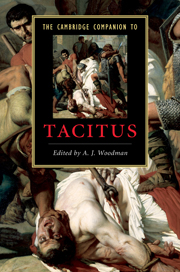Book contents
- Frontmatter
- Introduction
- Part I Contexts
- Part II Texts
- Part III Topics
- 10 Tacitus’ personal voice
- 11 Tacitus as a historian
- 12 Res olim dissociabiles: emperors, senators and liberty
- 13 Style and language
- 14 Speeches in the Histories
- 15 Warfare in the Annals
- Part IV Transmission
- Chronological table
- Abbreviations and bibliography
- Index
11 - Tacitus as a historian
from Part III - Topics
Published online by Cambridge University Press: 28 March 2010
- Frontmatter
- Introduction
- Part I Contexts
- Part II Texts
- Part III Topics
- 10 Tacitus’ personal voice
- 11 Tacitus as a historian
- 12 Res olim dissociabiles: emperors, senators and liberty
- 13 Style and language
- 14 Speeches in the Histories
- 15 Warfare in the Annals
- Part IV Transmission
- Chronological table
- Abbreviations and bibliography
- Index
Summary
Many of the chapters in this book explore in their different ways the distinctive character of Tacitus as a historian. This one will sketch some of his general conceptions of history and show how he conveys them. / A philosophy of history? / Did Tacitus have a general philosophy of why things happen and, if so, does he make it explicit? Can we look to him for a theory of history, for systematic thinking about human life and its vicissitudes? The signs are not good, for no one who has considered these questions has emerged with a plausible picture of Tacitus as a thinker. On the contrary, opinions are divided between those who blame him for muddle-headedness and those who justify the muddle. 'Certitude is not given to mortals, and Tacitus is redeemed by his respect for the eternal ambiguities', writes Syme at the conclusion of his discussion. B. Walker, charitably, had pointed to a deep pessimism as the only unifying idea.
- Type
- Chapter
- Information
- The Cambridge Companion to Tacitus , pp. 168 - 183Publisher: Cambridge University PressPrint publication year: 2010

